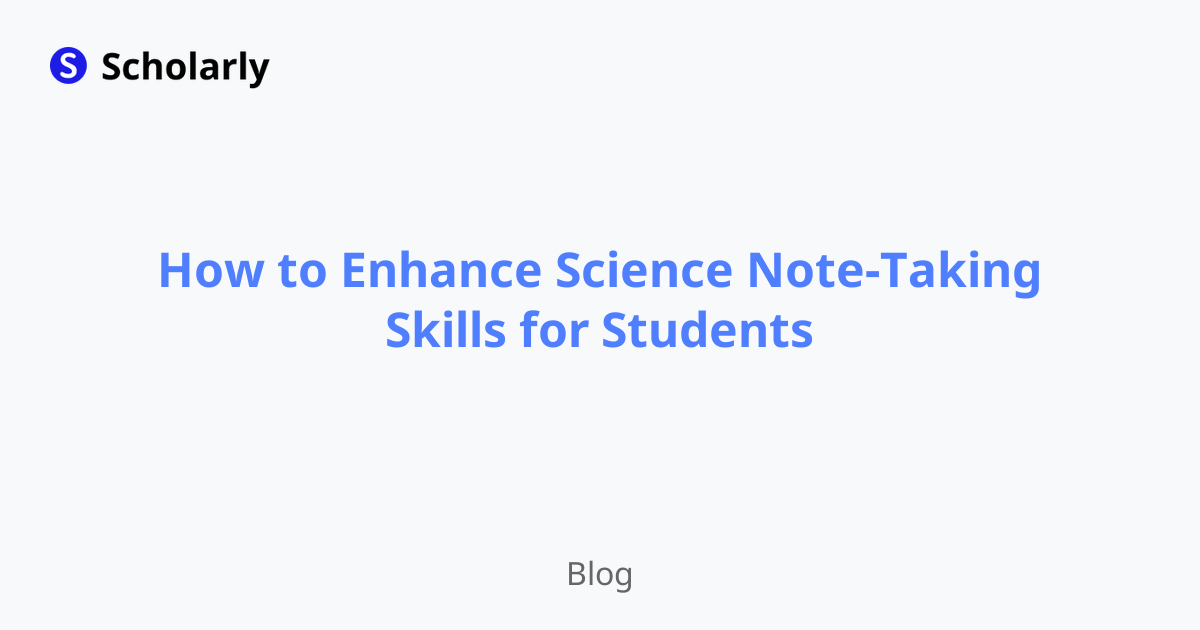How to Enhance Science Note-Taking Skills for Students
Discover effective strategies for science note-taking that will help students improve their understanding, retention, and application of scientific concepts.

Introduction
Science note-taking plays a crucial role in helping students better comprehend and apply scientific concepts. By capturing key ideas, observations, and experiments, students can reinforce their understanding and improve their retention of scientific knowledge. In this article, we will explore various strategies to enhance science note-taking skills for students. These techniques will enable students to organize their notes effectively, identify important details, and create a valuable resource for future reference.
Importance of Science Note-Taking
Effective note-taking is essential for students to excel in science subjects. It helps students:
Improve Understanding: Taking notes actively engages students in the learning process, facilitating comprehension of complex scientific concepts.
Enhance Retention: Reviewing well-organized notes enhances memory recall and aids in long-term retention of scientific knowledge.
Facilitate Application: Well-crafted notes serve as a valuable resource for solving scientific problems and applying concepts in real-world scenarios.
Now let's explore the best practices for science note-taking:
Best Practices for Science Note-Taking
Prepare Ahead: Before each science class or lecture, familiarize yourself with the topics to be covered. Reviewing the previous lecture's notes is essential for making connections and building on existing knowledge.
Active Listening: Stay engaged during the class or lecture by actively listening and participating. Focus on capturing key ideas, definitions, and explanations provided by the instructor.
Use Abbreviations and Symbols: Develop a set of shorthand abbreviations and symbols to record information quickly. This saves time and helps in capturing essential details without compromising comprehension.
Organize Information: Use structured note-taking methods like Cornell Notes or outlining. Divide your notes into sections such as headings, subheadings, and bullet points to create a clear and organized framework.
Highlight and Color Code: Utilize highlighting and color coding techniques to emphasize important concepts and key terms. This visual differentiation aids in quick comprehension and easy review.
Include Visuals: Diagrams, charts, and illustrations can enhance understanding and make complex concepts more accessible. Make sure to label and explain these visual aids in your notes.
Review and Summarize: Regularly review and summarize your notes after each class or study session. This helps reinforce learning and identify any gaps in understanding.
Ask Questions: If you encounter unclear or confusing content, don't hesitate to ask questions or seek clarification. Add these questions to your notes and make a note to follow up on them later.
Create Concept Maps: Use concept mapping to visually map out the relationships between different scientific concepts. This technique helps in understanding the broader picture and how different ideas connect.
Utilize Technology: Leverage note-taking apps, digital tools, and online resources to enhance your science note-taking experience. These tools can provide additional features like audio recording, cross-referencing, and cloud storage for easy access.
Pros and Cons of Science Note-Taking
Here are some pros and cons of science note-taking:
Pros:
Reinforces learning and understanding of scientific concepts
Provides a comprehensive study resource for exams and tests
Aids in the retention of scientific knowledge
Enhances critical thinking and analytical skills
Helps students actively engage in the learning process
Cons:
Requires time and effort to organize and maintain notes
May lead to information overload if not structured properly
Reliance on handwritten notes may result in illegible or messy content
Can be challenging for students with learning disabilities
Difficulty in capturing experimental procedures and observations in real-time
Comparison of Science Note-Taking Apps
Evernote: This popular note-taking app offers a range of features like audio recording, image annotation, and cross-platform syncing. It allows users to create organized notebooks and easily search for specific notes.
OneNote: Microsoft's OneNote provides a user-friendly interface for digital note-taking. It supports multimedia integration, handwriting recognition, and collaboration features. OneNote is compatible with various devices and offers seamless synchronization.
Notability: Designed specifically for iPad users, Notability offers a seamless note-taking experience with handwriting recognition, audio recording, and PDF annotation. It allows users to create multimedia-rich notes and offers cloud syncing.
Google Keep: Google Keep is a simple and straightforward note-taking app that syncs across devices. It supports text, voice, and image notes, as well as color coding and reminders for easy organization.
Paper by Dropbox: Paper is a collaborative note-taking app that combines text, images, and media in a clean and intuitive interface. It offers real-time collaboration and syncing, making it suitable for group projects or study groups.
Conclusion
Enhancing science note-taking skills is a valuable asset for students pursuing scientific studies. By implementing the best practices mentioned above and leveraging technology, students can create well-organized, comprehensive notes that enhance their understanding, retention, and application of scientific concepts. Remember, effective note-taking is an active process that requires attention, engagement, and regular review. With consistent practice, students can improve their science note-taking skills and excel in their scientific endeavors.
Try Our Popular AI Study Tools
Transform your study materials into interactive learning experiences with our most popular AI-powered tools:
PDF to Flashcards
Convert lecture notes and textbooks into study flashcards instantly
Text to Flashcards
Turn any text or notes into comprehensive flashcard sets
Image to Flashcards
Convert diagrams and handwritten notes into digital flashcards
YouTube to Flashcards
Generate flashcards from educational video content



